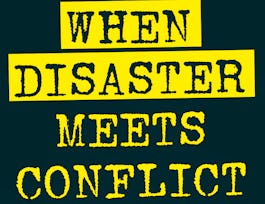Modern organisations are characterised by increasingly higher levels of uncertainty, complexity and diversity. In our current globalised work environment, how can you manage the power and politics that persistently influence organisational decision-making? Being savvy about organisational politics and having the nous to negotiate and resolve conflict is a critical capability for managers at all levels. This course will develop your negotiation and conflict resolution skills – crucial to becoming a positive influence in your organisation. Via structured learning activities (video lectures, quizzes, discussion prompts and written assessments) you will conceptualise and measure power and politics; analyse and develop strategies for influencing stakeholders; and learn how to act with integrity and purpose when ‘playing politics’.



Negotiation skills: Negotiate and resolve conflict
This course is part of Influencing: Storytelling, Change Management and Governance Specialization

Instructor: Dr Andrew Heys
Sponsored by Mojatu Foundation
34,025 already enrolled
(746 reviews)
What you'll learn
Critically evaluate conflict theories and apply frameworks and intervention processes to mitigate/reduce the negative effects of conflict at work.
Develop and analyse strategies and tactics to undertake both one on one, multiparty and also team based negotiation processes
Evaluate negotiation and conflict resolution processes against criteria informed by negotiation theory and concepts of forces in the negotiation.
Skills you'll gain
Details to know

Add to your LinkedIn profile
9 assignments
See how employees at top companies are mastering in-demand skills

Build your subject-matter expertise
- Learn new concepts from industry experts
- Gain a foundational understanding of a subject or tool
- Develop job-relevant skills with hands-on projects
- Earn a shareable career certificate


Earn a career certificate
Add this credential to your LinkedIn profile, resume, or CV
Share it on social media and in your performance review

There are 6 modules in this course
Negotiation and conflict resolution have long been considered important skills for managers. Now, as the future of work comes into focus, a mastery of negotiation and conflict resolution. along with superior interpersonal skills, cultural competencies and emotional intelligence, are seen by many as essential. These relating skills define resilient leaders, support sustainable organisations and are a distinctive feature of healthy and inclusive communities. This week you will explore concepts central to the fields of negotiation and conflict resolution. You will learn to recognise negotiation opportunities when they arise, how to differentiate between negotiation and conflict resolution situations and how to analyse and plan an intervention so you are well prepared before you begin to interact with a counterpart or with others locked into conflict.
What's included
6 videos3 readings1 assignment
What causes negotiation breakdowns and escalations of conflict? Are disagreements, difficult conversations and such problems at work something to be avoided? Or, is human conflict an inevitable and indeed necessary feature of healthy organisations and societies? This week we examine some of the core principles used to address social conflict across a range of different contexts; from interpersonal situations through to workplace conflict and also conflict in and between communities. You will learn some of the common reasons why deadlocks and other difficulties emerge and why negotiations sometimes stall and even ‘break-down’.
What's included
4 videos1 reading2 assignments
The renowned 20th century psychologist Erik Erikson once said that ‘the more you know yourself, the more patience you have for what you see in others’. Eriksen’s words ring true for negotiators; it is crucial that negotiators come to know their own “hot buttons” and to be self-aware - of values, biases, beliefs and the effect of certain behaviours. This week you will be introduced to several methods of self-assessment to help you gain that self-awareness. One of these tools will help you identify what is called your ‘conflict style’. By completing a self-assessment students will become aware of, and then consider the likely implications of, their preferred conflict styles on their interpersonal effectiveness. To add context and aid discussion you will review several organisational cases that highlight how a lack of self-awareness can lead to unresolved organisational conflicts and can have serious consequences on both individuals and on organisations.
What's included
4 videos2 readings1 assignment
Within every situation labelled “a negotiation” there will often exist a number of ‘subordinate’ negotiations that must be successfully navigated to achieve a successful outcome. In addition to the stated negotiation agenda - the topic at the centre of the discussion - we can identify two other negotiations. Firstly, there is a negotiation that takes place around the parties’ current or future relationship, and secondly, there is a negotiation that takes place around the process that will be followed. While these subordinate negotiations are clearly very important, they are often largely ignored when negotiators are planning. In this week’s session you will learn about what are called “the three negotiations” - content, process and relationship. You will learn how to identify process problems in negotiation and how to bring a stalled negotiation back on track. You will learn how to build trust in negotiation and how to preserve or enhance your relationship with your negotiation counterparts without compromising your own interests.
What's included
4 videos1 reading2 assignments
How should negotiators adjust their approach when working across a cultural divide? We address the critical question of culture this week and look at a number of key issues faced by negotiators when working across cultures. You will learn how cultural values manifest as different expectations and in communication differences in negotiation. You will learn about how to read a room for subtle messages. You will also learn about the concept of ‘saving face’ in negotiation and its importance especially in Asian countries and how to adjust your style to account for cultural differences and ambiguous situations.
What's included
4 videos3 readings1 assignment
How do we cope with complexity in negotiation and conflict resolution? What makes certain situations more complex and more difficult to resolve than others? To answer these questions we consider the following issues: the length of time involved, the number of issues under review, the number of parties involved and how ‘invested’ they are in a particular outcome. This week you will learn what makes certain situations more complex and how to deal with this complexity. We study the role of sequencing in negotiation (breaking a large negotiation down into a series or sequence of smaller negotiations) and you will also learn about an approach called 3D negotiation in which a holistic negotiation strategy is emphasized where what happens away from the table (changing the context) is seen as a crucial variables influencing the final outcome. This week you will also study how complex conflicts can be redefined, reframed and ultimately transformed an exciting new direction in the field of conflict resolution.
What's included
5 videos1 reading2 assignments
Instructor

Offered by
Why people choose Coursera for their career




Learner reviews
746 reviews
- 5 stars
76.20%
- 4 stars
19.11%
- 3 stars
3.74%
- 2 stars
0.66%
- 1 star
0.26%
Showing 3 of 746
Reviewed on Apr 6, 2024
I'm an university student. I would like to take this opportunity to thank the lecturer, University and Coursera. This course is amazing.
Reviewed on May 31, 2020
One of the best courses I took on the Coursera platform. Induced a lot of learning. Special thanks to the wonderful instructor and Coursera.
Reviewed on Jun 21, 2020
Dr Andrew mentioned and explained the lesson in the best way . I learned and enjoyed the course. These course will help the candidate from all backgrounds
Recommended if you're interested in Business

Erasmus University Rotterdam

University of California, Irvine

University of Colorado Boulder

Open new doors with Coursera Plus
Unlimited access to 10,000+ world-class courses, hands-on projects, and job-ready certificate programs - all included in your subscription
Advance your career with an online degree
Earn a degree from world-class universities - 100% online
Join over 3,400 global companies that choose Coursera for Business
Upskill your employees to excel in the digital economy



